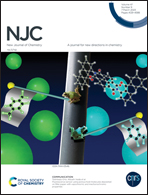Hydrosilylation and electroreduction of CO2 using a zirconocene hydride catalyst†
Abstract
A zirconium-based catalytic system using the commercially available complex [Cp2ZrHCl] (Schwartz reagent) was developed for the hydrosilylation of CO2 to yield methanol via the formation of methoxy-silanes with excellent yields (>99%). Key mechanistic insights are also documented. In addition, electrochemical studies were carried out to determine its electro-reductive activity, and CO was identified as one of the CO2 reduction products.



 Please wait while we load your content...
Please wait while we load your content...